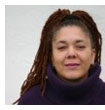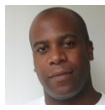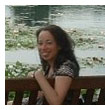|
Intermix.org.uk is a website for the benefit
of mixed-race families, individuals and anyone who feels they have a multiracial
identity and want to join us. Our mission is to offer a view of the mixed-race experience, highlighting icons, film, books, poetry, parenting techniques, celebrities, real lives and much more. Our online forums are a great place to meet others, ask questions, voice your opinions and keep in touch. Sign up for our monthly newsletter and delve into our pages. Want to join in? Become an Intermix member to take part: |
Mixedness & Mixing E-Conference
Day 3 Participation: Panel Comments

Sharron Hall is from Moss Side, Manchester. Her mother is English and her father from Barbados. Sharron is the founder and editor of Intermix.org.uk, a website offering news and views of the mixed-race experience from all over the world, for which she received a Family Learning Millennium Award in 1999.
When I began Intermix in 1999 there were often conferences about mixed-race issues with barely a mixed face in sight. There was plenty of discussion about the growing number of mixed-race children but nothing about the needs and representation of mixed-race adults. Whilst it is important to listen to those who view from outside the experience, it is vital those within it lead the way.
We exist in all areas of UK society as politicians, doctors, teachers, scientists, TV presenters etc so it cannot be said that we don't participate. What can be said is that our participation is not seen as mixed participation. That would be acceptable if we lived in an equal society but we don't. Your racial background should not be put in front of the job you do, unless that job requires it, however where there is racism and inequality there is a need to correctly identify those who succeed. This enables others to see themselves positively reflected in society and to know they are an included part.
If all you see is issues, what do you have to aspire to?
Changing societies perceptions of mixedness by challenging racist attitudes, ensuring accurate portrayals and representing ourselves will bring real change. It requires participation but more importantly it requires others to recognise the mixed population is not a set of issues and statistics, 'something has to be done about'. It is a growing community of ordinary people who want to be seen and treated as equal members of society.
There are some particularly interesting papers today. Emma Dabiri talks about mixed-race people in advertising something I feel strongly about. She raises some important points about the use of mixed-race people to represent the 'acceptable' face of black and the presence of shadism within Black and Asian communities.
One of the most common statements I hear from mixed-race people is that they wish they could speak the language of their parents. The references to the passing on of language in Bina Radia-Bond's paper and how not passing your language on to your children and your partner for that matter can affect participation in their ethnic communities is welcomed.
Always keen on balanced research I was impressed with Professor Martyn Barrett's paper on research with mixed-race youth, which shows the fluidity of mixed identity amongst young people. Bradley Lincoln also impresses with his views on his racial identity and the work he is doing with young people.

Dr Rob Berkley is Deputy Director of the Runnymede Trust, an independent policy-research organisation focusing on 'race' and social policy. His doctoral studies focused on exclusions from school and his continuing research interests lie in public policy, multiple identities, educational disadvantage, young people, 'race', ethnicity and social justice. Recent publications include ‘Identity, Ethnic Diversity and Community Cohesion’ (Sage: London 2007), ‘Britain; challenges for race equality’ (2006) and ‘Connecting British Hindus’ (2006).
Participation of all citizens, including those racialised as mixed, is crucial for the successful functioning of a democracy. Individuals from all groups/backgrounds need to feel that public institutions in a democracy will treat them fairly but also that they will be able to participate as an equal in public debate. Public officials are important arbiters in a democracy and so should be broadly representative of various groups in society. This is not because 'Indians understand Indians' or 'women understand women' but for two different reasons. Papers focused on equality earlier in this conference have shown us that the data suggest many people racialised as mixed face barriers to participation.
First, in a society with persistent and structured disadvantage, it can be hard for members of dominant groups to get access to certain kinds of knowledge. Unless we assume that public officials have full knowledge of the needs of all citizens, we have to accept that members of disadvantaged groups may need to be represented in order for the legitimate and objective needs of those groups to be met. This is as true for working-class Britons as it is for BME Britons. In democracies throughout the world, there is a noted tendency for policy to meet the needs of more powerful groups before others, a tendency that seems more likely to be the result of a lack of knowledge that any malevolence.
Second, having representatives of a group in important political positions increases the likelihood of political institutions being viewed as fair and impartial. Where there is a lack of diversity in a local council or political party, disadvantaged groups may be hesitant in accessing public services or in contributing to public debate about future policy developments. Again, this is not a question of 'Blacks representing Blacks', but about the self-confidence that is often required to interact with political institutions or engage in public debate.
When other citizens have stereotypes regarding the skills and competences of different groups, individuals from those groups can have difficulty in participating, and democracy suffers. This is bad for all of us. Providing everyone with an equal chance to participate does not mean that everyone will in fact participate, but it will result in a better democracy that benefits all of us.
These papers point to ways in which participation can be encouraged and developed for people racialised as mixed. Through organisations that enable people to reflect and share their experiences (Lincoln, Olumide, Hall, Funge), or through the use of new media technologies to create spaces that reflect community through diversity (Aghdiran). Hall's analysis asserts the need for community building, while Olumide takes a more cautious approach, arguing initially for enabling a sense of belonging and affinity. Lincoln and Funge argue simply for space (in particular for young people) to be 'heard, listened to and understood'.
Barret and Mahamdallie report on their research into the cultural practices of people racialised as mixed, reinforcing the diversity of experience, and the relationship with other 'identity indices' - gender, class and location. O'Brien highlights the experience of Anglo-Indian communities; defined by their mixedness. He also notes the importance of participation in public institutions. Dabiri reminds us that participation beyond public office is important - particularly in the media and advertising where powerful images work to situate others and set out to manage our aspirations.
Ensuring that all are able to participate as an equal in our democracy is a key task for policy, in many cases this will involve challenging racist discourses and enabling people to be confident in their identity.

Dr Chamion Caballero is a research fellow at London South Bank University and is currently working with Professor Rosalind Edwards on a project funded by the Joseph Rowntree Foundation looking at the experiences of parents from different racial, ethnic and faith backgrounds. She has a longstanding research interest in issues around mixed identities, particularly around the theorisation of mixedness, and was one of the authors of the DfES report 'Understanding the Educational Needs of Mixed Heritage Children', published in 2004.
From yesterday's more personal focus on interaction and lived experience, today's debates moves outwards again through its focus on participation.
One of the overriding themes of the papers submitted to the conference has been the need to challenge the pervasive stereotypes and assumptions about those who are mixing and of mixed race, ethnicity and faith through a more sophisticated focus on their actual lived experiences. The idea of people from mixed backgrounds as being inherently confused, and their parents as unable to sustain relationships or provide a positive sense of identity and belonging, has been challenged time and time again by contributors, many of whom interrogate the traditional 'causes' of those problems that some mixed people and couples face.
In addition to the persistent concept of their identity confusion, people from mixed backgrounds are also imagined as marginalised, 'tragic mulattoes' who are 'marooned between communities', neither one thing, nor the other (yet somehow both). Meanwhile, those in mixed relationships are often imagined to be cast out of both family and community, destined to live 'between two worlds'. However, the papers that are grouped under today's theme present a different story.
From a series of different fields, contributors argue that the lived experiences of mixed people and couples indicate that they participate just as fully in social and cultural British life as do other groups. Written from both research and personal perspectives, a number of papers discuss different forms of social and cultural participation for mixed people and couples, whether on everyday levels of interaction (Martyn Barrett, Tod O'Brien), or in more specific areas, such as the arts (Hassan Mahamdallie) or advertising (Emma Dabiri). Nevertheless, as some of these contributors point out, what may seem like positive accounts of this participation, can be just as detrimental to seeing mixed people and couples as 'normal'. The issue of whether the 'exotic' mixed race person who 'builds bridges between communities' is simply the other side of the 'marginalised and tragic mulatto' coin is raised again in some of these papers, as it has been elsewhere during the conference.
The question of the participation of mixed people and couples is also raised in a number of papers which discuss the participation of mixed people and couples beyond the level of the individual. Several contributors discuss their involvement in grassroots organisations, stressing the importance these groups have played in supporting and helping mixed children, people and couples to share their experiences with others who understand firsthand both the normality and the complexities of their situation (Bradley Lincoln, Sue Funge, Jill Olumide). Others raise interesting questions of mixedness beyond the level of the groups through the concept of a mixed 'communities', not only where these are in evidence - such as the Melungeon community in the States (Emily Hicks) - but also in relation to their possible existence in Britain (Sharron Hall) and the place of new technologies is in facilitating their presence (Veli Aghdiran).
Research and public debate in the UK on issues around mixedness and mixing has long been overshadowed by the much greater body of work in this area that has taken place in the USA, despite the different histories and conceptualisations of race and ethnicity in the two countries. However, as the papers submitted to this conference demonstrate, both in this stream and others, there is a great deal of fresh and innovative thinking that is emerging from Britain on this subject. The debate that will be generated here again today by these papers is part of an exciting new dialogue that has the potential to transform the way that those who are mixing and of mixed race, faith and ethnicity both live their lives and have those lives understood.
